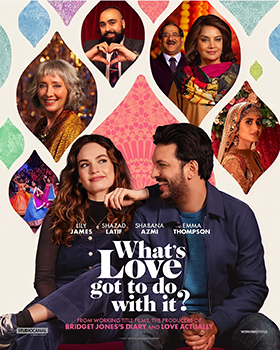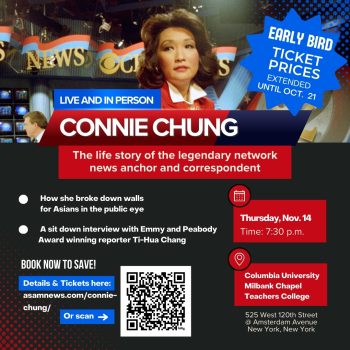From the producers of Love Actually and Bridget Jones’s Diary, What’s Love Got to Do with It? is a rom-com with all the heartfelt trappings. Kaz Khan (Shazad Latif) is a man looking to fall in love and settle down. Zoe Stevenson (Lily James) is his documentarian next-door neighbor and childhood friend who is a dating app pro but strikes out on dates. Kaz becomes the topic of Zoe’s next documentary when she decides to film his journey from London to Lahore as he meets the bride who was arranged for him. Through this process, both Kaz and Zoe learn lessons about love, the most important one being that there is not just one way to find it.
Directed by award-winning filmmaker Shekhar Kapur (Elizabeth) and written and produced by Jemima Khan (Impeachment: American Crime Story), What’s Love Got to Do with It? has assembled a great and diverse cast that is capable of showcasing the charm of arrange marriages and providing a concise overview of Pakistani and, more broadly, South Asian culture and traditions. In addition to the leads James and Latif, the supporting cast includes Shabana Azmi (Halo), Emma Thompson (Matilda), Sajal Ali (Yaqeen Ka Safar), Asim Chaudhry (Black Mirror: Bandersnatch), Jeff Mirza (Eternals) and Pakistani singer Rahat Fateh Ali Khan as himself.
In an interview with AsAmNews, director Kapur discussed how one of the goals in making this film was to make a strong case for arranged marriages as a reasonable option for consenting parties — after all, it must be better than swiping right and left on dating apps. In many ways, the conflict and comedy of the film loosely reflect Kapur’s personal lived experiences of being Pakistani and being Asian in general.
“I realized whilst making this film that although it is about the mess of an Asian family and arranged marriages/assisted marriages, when I look at it from the surface, I am actually creating a film about my own family and experiences,” Kapur said.
“There are stereotypes around arranged marriages: that it is forced, tribal and primarily seen in Muslim and/or South Asian communities — I want to disrupt these stereotypes and present different cases for these type of unions,” he continued.
For Latif, who plays the primary protagonist Kaz, seeing arranged marriages as something rigid, conservative and forced is a very narrow view of the process considering how popular it has become all over the world, with websites for parents to choose suitable partners for their children and popular reality shows based on arranged marriage proliferating.
“Those who see arranged marriages as religious or forced will have a hard time changing their perceptions because they will always be stuck in the same thought process,” Latif said. “Yes, back in the day, it was probably forced, but now, it is a process many young people are choosing as it is not easy to find love.”
“I think this film cleverly puts the fun in this process and shows that there really isn’t too many differences between hiring a matchmaker or using dating apps to find love — in both, everyone needs to consent before anything else progresses,” he continued.
One strength of the film is how it demonstrates that intimacy is a constant search. Whether one finds their partner by chance, through an arranged process or via dating apps and websites, there is not one right way, and no matter what path one chooses, it is the effort one puts in which makes both the love and partnership long-lasting.
“It doesn’t matter whether you find love in an arranged marriage or through meeting someone via a dating app; at the end of the day, you still need to make your own choice,” Kapur said. “Finding the intimacy is the true test, and there is no one right way to find it and to make it last.”
Latif expressed a similar sentiment about the unique experience of falling in love. “Whatever process one chooses to find their love partner, as long as there is mutual chemistry and emotional response, that is all that matters, isn’t it?” he said. “Finding love and intimacy is a major life decision, and no one should judge how you find it and who you find it with.”
Finally, when it comes to breaking stereotypes, one must not forget that this is a film where Asian men are the primary love interests. After decades of emasculating and negative stereotypes of Asian men in Hollywood and Western media/entertainment, it is refreshing to see a new film joining the select few that have shown Asian men as attractive, desirable people who are entitled to love whomever they choose.
“Growing up in the United Kingdom, I never really saw someone who looked like me being portrayed as heroes or as the main love interest,” Latif said. “I never imagined back then that one day, I would be playing a character that does find love.”
“It is important as Asians that we disrupt and subvert these negative stereotypes because it is a strong statement that we are confident, attractive and are not inferior to any other race of men,” he concluded.
What’s Love Got to Do with It? will be officially released in the theatres on May 5, 2023.
AsAmNews is published by the non-profit, Asian American Media Inc.
We are supported through donations and such charitable organizations as the Robert Wood Johnson Foundation. All donations are tax deductible and can be made here.
Please purchase your tickets to our fundraiser Up Close with Connie Chung, America’s first Asian American to anchor a nightly network newscast. For a limited time, you can get 10% off tickets. The in-depth conversation with Connie will be held November 14 at 7:30 at Columbia University’s Milbank Chapel in the Teacher’s College. All proceeds benefit AsAmNews.



